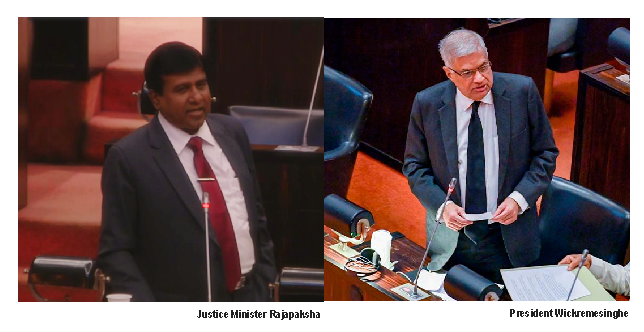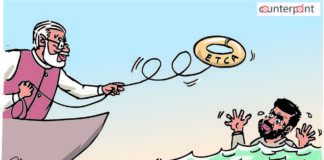By Vishvanth
Rhetoric and diatribe are crescendoing as the next presidential poll approaches. Some election campaigns have already gone into overdrive with prospective candidates traversing the country in a bid to garner votes. Speculation is still rife in political circles that the government may hold parliamentary polls before the presidential contest. Whichever election comes first, there will be no let-up in the escalation of verbal battles, and the intensity of campaigning.
What characterizes the run-up to a Sri Lankan election is a sharp increase in the intensity of vitriolic attacks politicians carry out against one another as well as others they consider obstacles in their path. The situation however is not as bad as it used to be; it has improved somewhat compared to that in the pre-2015 era, when the ruling party politicians brazenly flouted the law of the land with impunity, going so far as to assault, intimidate or even physically eliminate their rivals to retain power.
Sri Lanka’s political history is replete with instances of bloodletting before and after elections, which were also marred by large-scale rigging to the extent of the legitimacy of winners and the integrity of the electoral process being in question. Thankfully, the past decade or so has seen only verbal bloodletting, so to speak, among power-hungry politicians and their die-hard supporters. But there is no guarantee that the country will not slide back into unbridled election violence, for it is still without robust safeguards against the scourge of political violence, and the culture of impunity prevails to all intents and purposes.
Justice Minister’s ire
Justice Minister Wijeyadasa Rajapaksha is eyeing the coveted executive presidency and has thrown his hat into the ring. He was planning to contest the upcoming presidential election as the SLFP’s presidential candidate with the help of former President Maithripala Sirisena, who subsequently resigned as the SLFP leader, owing to a District Court injunctionwhich has restrained him from functioning in that position; the Sirisena faction of the SLFP elected Wijeyadasa as the party Chairman, but its rivals led by former President Chandrika Bandaranaike Kumaratunga have challenged his appointment legally and struck back politically; they are consolidating their power in the party. A move by the Sirisena faction to obtain an interim order preventing the members of SLFP Executive Committee from carrying out their duties and functions failed. Wijeyadasa, a senior President’s Counsel himself, has found himself caught in a legal tangle. Perhaps, this is not a situation that he and Sirisena bargained for when they shifted the battle for the SLFP leadership to the legal front with a view to making short work of their opponents.
Minister Nimal Siripala de Silva, appointed as the SLFP Chairman by the Chandrika faction, has gone on record as saying that his side has won all court battles over the intraparty dispute. He is a lawyer himself and has apparently sought to tease his rivals. He stands accused of being party to a campaign to align the SLFP with a coalition that President Ranil Wickremesinghe is planning to form soon.
It was against this backdrop that Wijeyadasa’s scathing attack on some judges, during his speech in the parliament on Wednesday, has come to be viewed. He declared that a handful of corrupt judges had brought the entire judiciary into disrepute. Citing examples, he said some judges who had committed serious offences such as obtaining water and electricity illegally and pilfering many bottles of scotch from a court storeroom had got off scot-free, and the misconduct of such judicial officials had caused public confidence in the judiciary to erode badly. He blamed the Judicial Services Commission being lenient towards such rogue elements in the judicial service, and claimed that he and the government were helpless. He went on to allege that some judges even colluded with lawyers, who obtained judgements they desired. It was a very serious allegation, which would have landed an ordinary person in trouble, for it amounts to an affront to the dignity of the judiciary, but the Justice Minister levelled it in Parliament and therefore he was covered by parliamentary privileges, which give him legal immunity.
Some Opposition MPs promptly took exception to the Justice Minister’s criticism of the judiciary. Wijeyadasa however is not likely to be deterred.
President’s tongue-lashing
The Justice Minister’s swipes at a section of the judiciary perhaps pale into insignificance in comparison to President Ranil Wickremesinghe’s ranting against the Supreme Court (SC) itself in Parliament on Tuesday (18). Raising concerns about the SC’s recent determination on the ‘Gender Equality’ Bill, President Wickremesinghe called for the appointment of a Parliamentary Select Committee (PSC) to review that judicial determination, which held that the Bill was inconsistent with the Constitution.
The government has said the Gender Equality Bill aims to ensure equal opportunities for all, regardless of gender or sexual orientation.
President Wickremesinghe went ballistic, claiming, “The Supreme Court has ignored a certain section that the Gender Equality Bill addresses. It has eaten up all the judgments including one which was given by a bench of ten judges with regard to women’s rights ….” He also claimed that the SC had ignored an amendment to the penal code by the Chief Justice, and a previous judgement by a ten-judge bench of the Supreme Court in respect of women’s rights.
“I don’t propose to summon judges before Parliament, but I suggest appointing a majority of members from the Parliamentary Women’s Caucus to the select committee,” Wickremesinghe told Parliament, raising a privilege issue. He emphasized that the House could not agree with the Supreme Court’s ruling. He did not mince his words when he said he considered what the SC determination on the Bill under discussion an act of judicial cannibalism.
President Wickremesinghe came under fire from the Opposition benches for lashing out at the SC. Some Opposition MPs considered his criticism as an attempt to intimidate the SC. The Bar Association of Sri Lanka has also frowned on the President’s verbal attack on the apex court.
Foretaste of what is to come?
Given the ferocity of two prospective presidential candidates’ diatribe against the judiciary on the floor of the House on Tuesday and Wednesday, it is not difficult to guess how aggressive all contenders for the highest position in the land will become as the presidential election draw nearer, with the disconcerting reality dawning on them that none of them might be able to obtain more than 50% of the vote to secure the presidency straightaway.
Both the SJB and NPP candidates, Sajith Premadasa and Anura Kumara Dissanayake, respectively, have been tearing into each other fiercely. Stakes for them are extremely high in the upcoming presidential election, which they cannot afford to lose. If Premadasa fails to secure the presidency, he will have failed twice in the presidential race, and he may experience an erosion of his parliamentary group as well as the support base. If Dissanayake loses, he may have questions being raised about the effectiveness of his leadership. If President Wickremesinghe fails to get popularly elected, the UNP will be left without any chance of revival much less improving its performance at the next parliamentary election.
So, chances are that we will witness the tightest-ever battle for the presidency this time, with the contenders pulling out all the stops to win.



 Logging you in...
Logging you in... Loading IntenseDebate Comments...
Loading IntenseDebate Comments...

